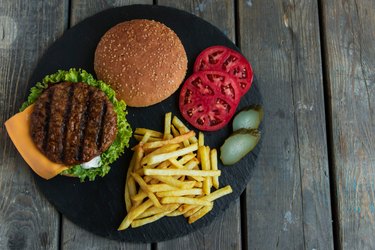
Whether you are grilling in your backyard or eating at a restaurant, it's hard to beat a juicy hamburger. Get the scoop on the nutrition and calories in a burger, as well as how to make it healthier without sacrificing flavor. From cheese to toppings, burgers can easily be customized to your taste.
Tip
The average calories in a burger are around 520, but cheese and other toppings may cause the calorie count to jump up quickly. There are a few easy tricks you can use to cut calories and add more nutrients to your burger.
Video of the Day
Homemade Hamburger Calories
Hamburgers are not only easy to make, but they're also a favorite choice for kids and adults alike. The basic recipe calls for a ground beef patty, which can be either grilled, pan-fried, flame-broiled or baked in an oven, and nestled between two hamburger buns. Cheese, onions, pickles, lettuce and tomatoes are some of the most popular toppings.
Video of the Day
When considering hamburger calories, beware that toppings do add up. Let's start with the most important part of the hamburger — the meat.
A typical burger contains about 4 ounces of ground beef, which, according to the USDA, is 375 calories. For those who like bigger burgers, add on an additional 94 calories for each ounce. A 6-ounce burger, for example, will have 563 calories just from the beef. A traditional white hamburger bun will add 145 calories.
According to the Cleveland Clinic, the ground beef in a burger is a good source of protein (16 grams in 4 ounces), niacin, vitamin B12, selenium and zinc. On the downside, beef hamburgers contain high levels of cholesterol (88 grams) and saturated fats (13 grams).
The American Heart Association recommends eating no more than 13 grams of saturated fat per day. You would reach this limit with just one hamburger per day. Saturated fats increase the amount of cholesterol in your blood, which in turn, may increase your risk of stroke and heart disease.
Consider the Calories in Toppings
Most people don't eat a hamburger without adding in some toppings for extra flavor. The most popular choices are bacon and cheese. But these calories add up.
A slice of cheddar cheese, for instance, adds 69 calories, while two slices of fried bacon add 90 calories. The calorie count for other popular hamburger toppings is as follows:
Gourmet burgers often have more adventurous toppings, which can further increase the calorie count. Avocados are full of antioxidants and healthy fats but provide about 16 calories per slice. For those who want a kick without the extra calories, poblano peppers add spice with just 5 calories per ounce.
Fast-Food Cheeseburger Calories
It's easier to control the calories in a burger when you're preparing it at home versus at a fast-food restaurant where extra sauces and other ingredients are added. Despite that, sometimes it is more convenient to drive through and pick up a ready-made burger.
The calorie count of some popular fast food burgers, such as McDonald's, Wendy's and Burger King, includes:
- McDonald's Cheeseburger: 300 calories
- McDonald's Big Mac Burger: 540 calories
- McDonald's Double Quarter Pounder With Cheese: 740 calories
- Burger King Hamburger: 240 calories
- Burger King Bacon King: 1,150 calories
- Burger King Extra Long Cheeseburger: 630 calories
- Wendy's Bacon Jalapeno Burger: 750 calories
If you plan on grabbing a fast food burger, your best bet is to go with a plain burger with a single patty rather than those with a double patty or extra cheese and toppings. As you can see, the plain Burger King hamburger has only 240 calories, compared to the Burger King Bacon King at 1,150 calories. You can also pick a junior size burger instead of a regular one to save calories.
Tips for Healthier Hamburgers
If you're making burgers at home, you can swap out ground beef for other types of meat to cut calories and saturated fat. Ground turkey, for example, has 230 calories in 4 ounces, with just 6 grams of saturated fat (versus 13 grams in ground beef). Ground chicken has just 162 calories and 3 grams of saturated fat per 4 ounces.
When eating out, meatless burgers seem like a good choice for vegetarians. However, Harvard Health Publishing says that they are heavily processed and contain a lot of saturated fat. On the plus side, eating a meatless burger is better for the environment as cattle ranches use lots of water and produce greenhouse gas emissions.
You can also cut calories by using sandwich thins as buns or skipping the buns altogether and just eat the hamburger patty by itself. If you prefer a bun with your burger, opt for a multigrain brand, which will provide more fiber and other nutrients than a regular white bun.
As far as the toppings, skip the mayo and bacon and load up on veggies, as well as ketchup and mustard for flavor. A healthy burger can also be a tasty burger!
- USDA FoodData Central: "Beef, Ground"
- Cleveland Clinic: "6 Easy Steps to Healthy Burgers You’ll Love"
- American Heart Association: "Saturated Fat"
- USDA FoodData Central: "Roll, White, Hamburger Bun"
- USDA FoodData Central: "Cheese, Processed Cheese Food"
- USDA FoodData Central: "Swiss Cheese"
- USDA FoodData Central: "Dill Pickle"
- USDA FoodData Central: "Onions, Raw"
- USDA FoodData Central: "Lettuce, Raw"
- USDA FoodData Central: "Tomatoes, Raw"
- USDA FoodData Central: "Ketchup"
- USDA FoodData Central: "Mustard"
- USDA FoodData Central: "Avocado"
- USDA FoodData Central: "Bacon"
- McDonald's: "McDonald's USA Nutrition Facts for Popular Menu Items"
- Burger King: "Burger King USA Nutritionals"
- Wendy's: "Bacon Jalapeno Cheeseburger"
- USDA FoodData Central: "Ground Turkey"
- USDA FoodData Central: "Chicken, Ground, Raw"
- Harvard Health Publishing:"Impossible and Beyond: How Healthy Are These Meatless Burgers?"